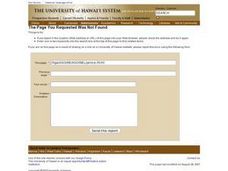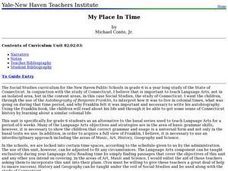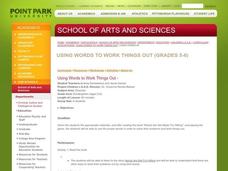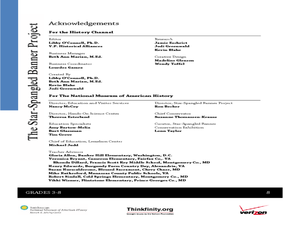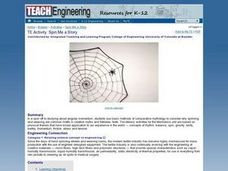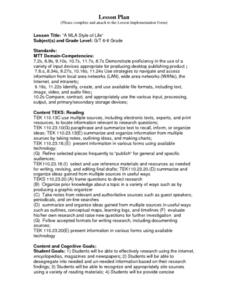Curated OER
The Fabric of Our World
Students discuss cultural diversity, and examine how the community reflects the cultural background of the inhabitants. They read the book, People, take a community walk, create a rainbow chart, and research other states for relocation...
Rutgers University
African-Americans in WWII
Using transcripts of interviews of African-Americans who served in WWII, class members work in pairs to understand their experience. Prior to the group work, the teacher provides background on WWII and the African-American experience....
Curated OER
The Purpose and Power of Persuasion
Examine the power of persuasion and have learners consider how it influences events in their own lives. After reading and analyzing informational texts to understand the author's purpose, class members take a written test and craft a...
Curated OER
Food Labels in the Classroom
Students study the nutritional information on food labels and become familiar with the basic dietary needs of the human body. They write letters to food companies.
Curated OER
Pets Around the World
Students communicate via e-mail with other students to learn about pets, animals of interest , and geography from different parts of the world. Vocabulary focuses on rural, urban, and suburban areas.
Curated OER
Teaching Rhythm and Pitch Reading
Students practice correct rhythms and pitches during this short lesson for the middle school instrumental class. Objectives vary depending on music used for the lesson. Students assessed through group playing in class.
Curated OER
Circular Motion
Learners research physical science by completing worksheets. In this gravity lesson, students read assigned text regarding the rotation of Earth and the gravitational force caused by the speed of which it rotates. Learners complete a...
Curated OER
How to Avoid Having a Bad Day
Second graders explore cause and effect. They read Alexander and the Terrible, Horrible, No Good, Very Bad Day. They discuss their own experiences with bad days. Students identify the causes and effects in the book. They write a letter...
Curated OER
Reading Plays
Young scholars examine the role of tone in a comedy play. They also discover how to paraphrase a passage and explain a character's point of view.
Curated OER
What is a Dictionary?
Second graders explore the purpose of a dictionary. For this library media lesson, 2nd graders explore My First Dictionary and identify guidewords, entry words, and captions. Students list ways they can use the dictionary.
Curated OER
Reading the Movies: Another Approach To Teaching Critical Thinking Skills And Writing
Students explore the elements of film to analyze character, action, and the themes in the movie, "Quiz Show." The lesson encourages students to make personal connections and real life applications as they view the movie, critically.
Curated OER
Studying The American Musical Theatre
Students discover the group dynamics necessary to produce an American musical in this six day instructional activity. Themes and characterization techniques are explored during collaborative small group research projects.
Curated OER
Map Reading
After examining a map from 1803 and 2003, they explore how to become map readers. They describe what they see on the map from 1803 and compare the information to the map from 2003. Students create their own map of the neighborhood that...
Curated OER
Famous Women in American History: Rose Freedman
Fourth graders read about Rose Freedman, a famous American woman. In this famous women in American history lesson, 4th graders read a story about Rose Freedman, answer comprehension questions, and complete an associated worksheet. They...
Curated OER
Olympics (Grade 4)
Students research information about the current Olympic research. In this Olympic research activity, students take a pre-test to determine their knowledge about the current Summer Olympics. They choose one of three areas to research and...
Curated OER
My Place In Time
Sixth graders interpret Franklin's style, his ease of writing and content, using this to inspire, motivate and guide them to do more writing. They list Franklin's civic accomplishments and political accomplishments. They name 4...
Curated OER
Using Words to Work Things Out
Students explore classroom community building. In this character development and community building instructional activity, students listen to Hands Are Not for Hitting and generate a class list of positive ways to handle classroom...
Curated OER
A History of the War of 1812 and The Star-Spangled Banner
Students examine the causes and outcomes of the War of 1812, and determine the chronology of the Star-Spangled Banner. In this War of 1812 lesson, students learn vocabulary and read a narrative about the War of 1812 before participating...
Curated OER
You've Got Mail
First graders study the postal system and letter writing. They exchange class letters with another class in a different area and become pen pals with residents in a local nursing home.
Curated OER
Las Misiones de California
Fourth graders work in partners to complete a series of activities. After reading the introduction, Students select a role of either a "Padre" or "Indigena." As partners, they need time on the computer for research as well as time to...
Curated OER
T'was the Night Before Christmas (Poem)
Students read the poem T'was the Night Before Christmas, and then partner with another student to complete a poem of their own based on the original. The new poem has missing words and students fill in the missing parts of speech like a...
Curated OER
Polluting the Environment
Fourth graders construct mini-ecosystem, pollute the ecosystem, observe, collect, and record data on the effects of these pollutants on their ecosystem, organize data on spreadsheets, create graphs, and design presentations to share with...
Curated OER
Spin Me a Story
Students examine the motif of spinning and weaving in myths and folktales. They read various myths, complete a WebQuest, develop a mind map of story elements, and write an original "spider" story.
Curated OER
"A MLA Style of Life"
Students effectively research using the internet, encylopedias, magazines and newspapers. They desegregate into needed and un-needed information based on their research findings. Pupils recognize and appropriately site sources using a...






